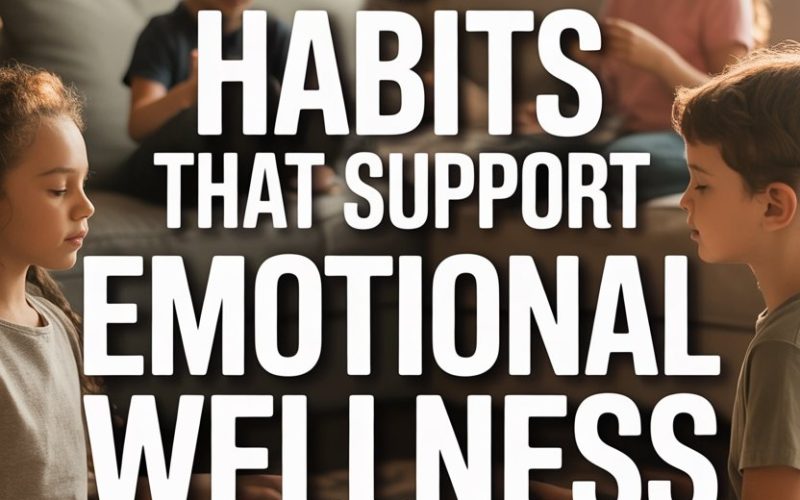If only raising emotionally robust kids were as simple as remembering to bring the reusable bags to the supermarket.
Kids come home with scraped knees, wounded feelings, and a fresh complaint about why you put “the wrong” cheese in their sandwich.
Parents are left juggling demands, feeling like referees at a never-ending wrestling match (one featuring tears, giggles, and the occasional flying shoe).
Still, emotional wellness isn’t a mystical unicorn. It shows up in the little things—habits that add resilience, empathy, and self-assurance to your child’s emotional toolkit.
Five daily rituals have proven, time and again, to give kids a fighting chance at calm, steady confidence, even on those days when your only victory is keeping everyone alive until bedtime.
1. Model Talking About Feelings
Children are natural mimics. If you’ve ever heard your child parrot your exasperated “Are you kidding me?!” at the telly, you know exactly what I mean.
Emotional wellness starts by normalising feelings—no matter how big, loud, or inconvenient they may be.
It’s tempting to shush a child’s outburst with a well-meaning “You’re fine!” or “No need to cry.” But feelings don’t magically disappear; they burrow deep, only to resurface at the least convenient moment (read: mid-supermarket meltdown).
Naming feelings, out loud and without judgment, helps children understand what’s happening inside their heads and hearts.
Try narrating your own emotions. “I’m feeling grumpy because traffic was a nightmare today.” Or: “I’m really proud of myself for finishing that boring paperwork.”
When adults label their emotions, children learn that all feelings—including anger, sadness, and joy—are normal parts of being human.
Dr. Marc Brackett, founding director of the Yale Center for Emotional Intelligence, champions this “emotion-coaching” approach.
His research highlights that children who learn to label their feelings have better social skills, fewer behavioural issues, and a stronger sense of self-worth.
It takes practice, especially if you grew up in a “stiff upper lip” household. Start small, and don’t worry if your vocabulary is rusty.
Even a simple “That looks hard—are you feeling frustrated?” opens the door to emotional literacy.
2. Build Predictable Routines
Life with kids rarely goes to plan. Still, a sprinkle of predictability goes a long way toward helping children feel safe and emotionally secure.
Knowing what’s coming next—whether it’s bath time, story time, or that blessed moment when school shoes come off—provides a sense of stability in an often chaotic world.
Routines don’t have to be rigid. They just need to be familiar enough for children to know what to expect.
This consistency gives kids a sense of control, which is the secret sauce for reducing anxiety (for you and them).
Younger children especially thrive on repetition. The same bedtime story, the same special plate for breakfast—it all helps.
Older kids may need more flexibility, but clear expectations (“We tidy up before dinner”; “Saturday is family movie night”) still provide anchors in the daily storm.
Research from the American Academy of Pediatrics shows that predictable routines are linked to improved emotional regulation, fewer tantrums, and even stronger parent-child bonds.
And honestly, a bit of structure helps parents too. When you’re running on caffeine and stubbornness, autopilot routines are the only way breakfast gets made before someone asks for a snack.
3. Foster Problem-Solving Without Swooping In
Nothing tests a parent’s patience like watching a child struggle with a shoelace, a maths problem, or a friendship spat. The urge to swoop in and fix things is powerful—especially when you’re running late or desperately need silence.
But children need chances to navigate small frustrations and setbacks themselves. It’s how they build grit, adaptability, and faith in their own abilities.
Instead of immediately offering solutions, try sidling up with a curious “What do you think you could try?” Or, “I see that puzzle is tricky—do you want a hint or more time?”
Sometimes, silence is the most supportive response you can muster. Breathe deeply. Sip your tea. Offer a sympathetic nod.
Harvard’s Center on the Developing Child describes “serve and return” interactions as building blocks of resilience. When adults support, but don’t hijack, children’s problem-solving, kids learn they’re capable of handling tough stuff.
Resist the siren call of helicoptering. Your child won’t remember that you tied their shoes every day, but they will remember how proud they felt the day they managed it all on their own.
4. Prioritise Play and Down Time
Between after-school clubs, piano lessons, and your third “urgent” work email of the evening, free time can feel like a fairytale. Yet unstructured play is the original self-care for children.
It’s how they process the big feelings, test new ideas, and recover from life’s bumps and bruises.
Building blocks, imaginary games, and a good old-fashioned mud pie aren’t just fun—they’re essential for emotional health.
Play is how children gain mastery over their world, learn to negotiate, and work through problems without grown-ups breathing down their necks.
The American Academy of Pediatrics recommends plenty of free play for healthy brain and emotional development. Even ten unscheduled minutes on the kitchen floor with Lego can work wonders for mood and confidence.
And don’t forget, family downtime counts. Laughter over a silly card game, a walk around the block, or an impromptu dance party in the kitchen can all reset the emotional temperature at home.
That’s not wasted time—that’s relationship gold.
5. Encourage Gratitude and Mindful Moments
Gratitude isn’t just for Thanksgiving dinner or writing thank-you cards. Regularly noticing what’s good—even on days when the cat has thrown up on your shoe—has been shown to boost mood, lower stress, and build lasting optimism.
Try weaving gratitude into daily routines. At dinner, everyone shares something they enjoyed about the day (yes, even if it’s just “the chips weren’t soggy for once”).
A gratitude journal by the bedside can work wonders for older kids, or you might try a mindfulness app like Smiling Mind for a few minutes of calm before bed.
Mindfulness doesn’t require fancy cushions or incense. It can be as simple as taking three deep breaths together, or pausing to notice the colour of the sky on the school run.
These small pauses offer a break from the constant “what’s next?” of family life and help kids build resilience to stress.
Research from the Greater Good Science Center at Berkeley shows that children who practice gratitude are happier, more empathetic, and bounce back faster from setbacks.
A little thankfulness goes a long way—especially if it gets you one step closer to a peaceful bedtime.
Everyday Magic Is in the Ordinary
Raising emotionally healthy kids isn’t about grand gestures or perfect parenting.
It’s about small, consistent actions—the chat in the car, the giggle before bedtime, the deep breath when you want to lose your marbles.
Nobody nails this every day.
The goal isn’t to raise a miniature Zen master, but a real child who knows their feelings matter and believes they can face tough moments with courage (or at the very least, with a comforting cuddle and a clean pair of socks).
Here’s to fewer meltdowns, more connection, and the satisfaction of knowing that every little habit counts—even when you’re running on cold tea and stubborn hope.




